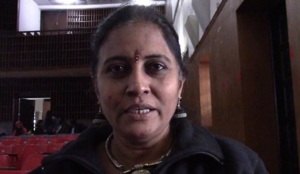 Ciamar a bhiodh eadh, nam faigheamaid cuidhteas gnè agus na tuisealan ann an Gàidhlig? Thòisich mi a’ smaoineachadh air an ceist seo an dèidh dhomh alt a leughadh anns an Washington Post mu oidhirp seòrsa Spàinnis a chruthachadh gun ghnè ann an Argentina, air sàillibh ’s gu bheil cuid am beachd gu bheil ceangal eadar cànan le gnè agus gnèitheachas.
Ciamar a bhiodh eadh, nam faigheamaid cuidhteas gnè agus na tuisealan ann an Gàidhlig? Thòisich mi a’ smaoineachadh air an ceist seo an dèidh dhomh alt a leughadh anns an Washington Post mu oidhirp seòrsa Spàinnis a chruthachadh gun ghnè ann an Argentina, air sàillibh ’s gu bheil cuid am beachd gu bheil ceangal eadar cànan le gnè agus gnèitheachas.
Abair gun dèanadh gluasad dha leithid diofar nam obair-sa. An ùine a bhios mi a’ cosg a’ feuchainn ri gnè agus na tuisealan a sparradh a-steach ann an inntinnean na oileanaich bochd agam, cha ghabh eadh tomhas. Is gann gun tig neach thugam a-nis a-mach à FMG le gnè agus na tuisealan coileanta aca, agus fiù ’s am measg cuid a fhuair Gàidhlig san dachaigh agus FMG, is àbhaist gum bi gnè agus na tuisealan aca fhathast cugallach.
O chionn fhada, dh’fheòraich mo cho-obraiche, Meg Bateman, carson a tha sinn fhathast a’ teagasg riaghailtean nach eil bitheanta tuilleadh? Carson a dh’fheumas sinn uibhir de phinn dearg a chleachdadh nar n-obair? (Faic: Gàidhlig Ùr, 2010)
Na gabhaibh dragh. Chan eadh rud a nì aon neach fa leth a tha seo. Bidh mi fhathast a’ teagasg na seann riaghailtean. Gus obair fhaighinn agus gus a bhith air an aithneachadh mar Ghàidheil le ’deagh Ghàidhlig’, feumaidh na riaghailtean traidiseanta uile a bhith aig na oileanaich agam. Ach ’s fhiach eadh faighneach, le bhith a’ cumail oirnn a’ teagasg na riaghailtean seo, dè da-rìribh a tha sinn a’ glèidheadh, agus dè na cothroman a tha sin a’ call?
Dè ur beachd?
PS, seo na riaghailtean gun-ghnè a chleachd mi gu h-àrd:
Riochdair: an seann riochdair neodrach Gàidhlig, eadh;
Riochdair sealbhach: am fear fireann, a (le sèimheachadh), ach chan eil fios agam gu bheil seo ceart. Is dòcha gum bu chòir riochdair sealbhach neodrach fa-leth a chleachdadh;
An t-alt singilte: an/m, (gun sèimheachadh, gun t-) anns a h-uile tuiseal;
An t-alt iolra: na (gun h-) anns a h-uile tuiseal;
Am buadhair: gun sèimheachadh, gun chaolachadh anns a h-uile tuiseal;
An t-ainmear singilte: gun chaolachadh anns a h-uile tuiseal;
An t-ainmear iolra: am foirm bunasach iolra anns a h-uile tuiseal.
Chan eil fhios ’m dè mholainn fhathast a thaobh riochdairean roimhearach, no riochdairean roimhearach sealbhach. Beachdan?



 Ciamar a bhiodh eadh, nam faigheamaid cuidhteas gnè agus na tuisealan ann an Gàidhlig? Thòisich mi a’ smaoineachadh air an ceist seo an dèidh dhomh alt a leughadh anns an
Ciamar a bhiodh eadh, nam faigheamaid cuidhteas gnè agus na tuisealan ann an Gàidhlig? Thòisich mi a’ smaoineachadh air an ceist seo an dèidh dhomh alt a leughadh anns an 